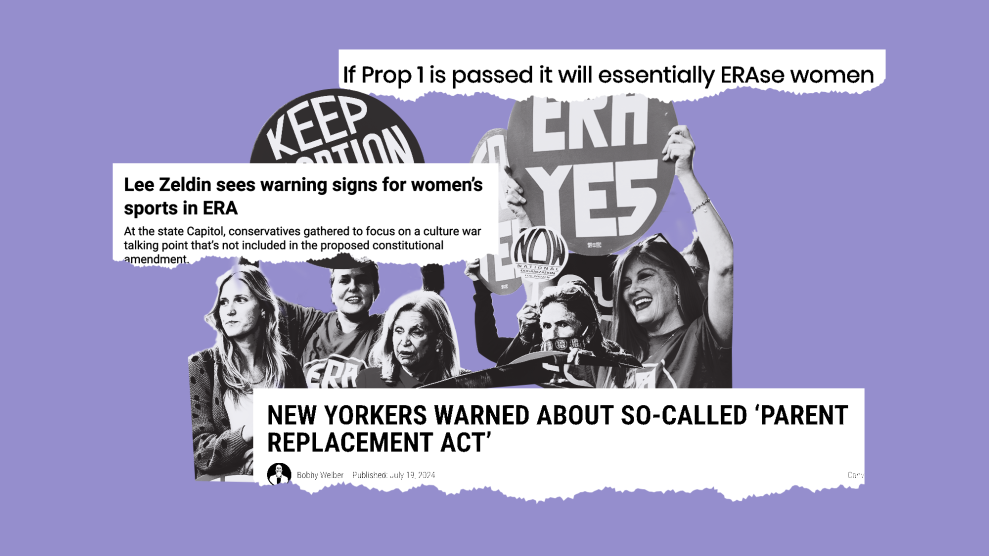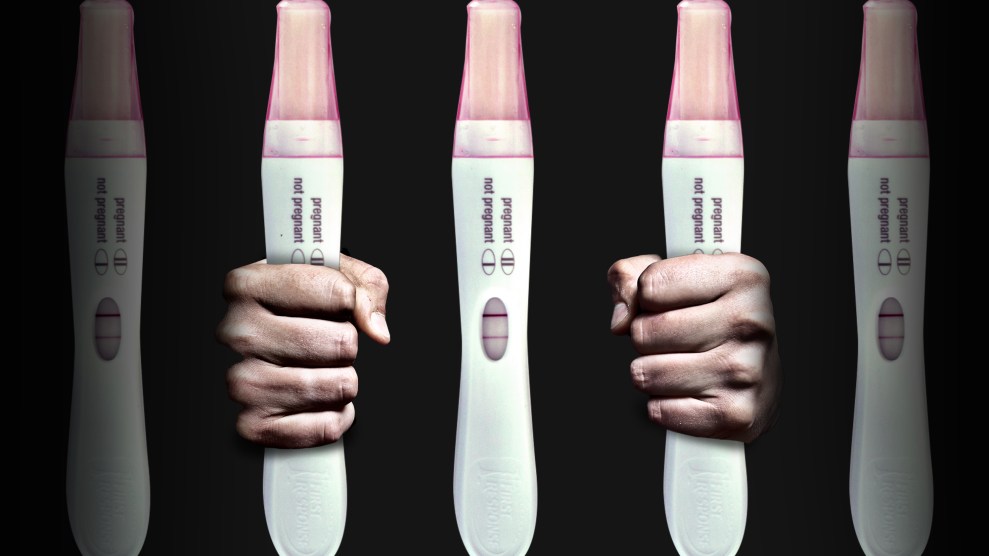“Today’s newsletter will probably overwhelm you,” Jessica Valenti wrote in a note preceding the Wednesday, September 25, edition of Abortion, Every Day, the Substack where she breaks down the news on reproductive rights. The first order of business: an explanation of how a powerful anti-abortion group is directing an ad campaign that blames pro-choice advocates for the deaths of Candi Miller and Amber Nicole Thurman. Miller and Thurman were two Georgia women who, according to a ProPublica investigation, died because of the state abortion ban. “Honestly, how dare they,” Valenti wrote. “How dare they use these women’s names; how dare they use their pictures. It’s just beyond the pale.”
The same newsletter also covered Florida Gov. Ron DeSantis’ efforts to oppose adding the right to abortion to the state constitution, a report on the increasing criminalization of pregnancy since the end of Roe v. Wade, and a summary of a New York Times/Reveal investigation into Florida maternity homes. That wasn’t even all of it—and that was just Wednesday.
Valenti, known for her previous columns at the Nation and the Guardian, has written about feminism and politics for nearly two decades. She started Abortion, Every Day almost immediately after the Dobbs v. Jackson Women’s Health Organization ruling leaked, when she found herself unable to turn away from the news. “It was not a deliberate pivot,” she tells me in a phone interview as she prepares dinner for her family in Brooklyn. “I was just so mad and upset. Like so many people, I think I just wanted to know everything, so I just started writing about it.”
She never stopped. “Hilariously,” Valenti says, “I really did ask myself in the beginning, ‘If I do this, am I going to have enough stuff to write about every day for more than a few months?’” Now, Valenti writes a newsletter every day of the workweek—mostly on her own, though she recently hired an assistant and a part-time researcher. She’s also gathered enough material to fill a new book, Abortion: Our Bodies, Their Lies, and the Truths We Use to Win, out this month. From the very beginning of Abortion, Valenti makes the case that the deluge of news is itself a part of the anti-abortion movement’s strategy. “The anti-abortion movement is hitting Americans with everything all at once in the hopes that those of us who want our rights back will be too exhausted and crushed to fight back,” she writes in the introduction. “It’s hard for any single person to keep track of all the anti-abortion attacks and tactics happening in different states around the country. But it’s vital that we do.”
It’s only by tracking the day-to-day onslaught that Valenti says she and, by extension, her readers can see the full scope of the attack on abortion rights. “I can see a difference in my own knowledge if I skip a day in the newsletter,” she says. “Things are moving so quickly.” If that seems exhausting, well, it is. “I think everyone who is working on this issue is in a very similar place, and I worry about burnout for myself and everyone who does this work because you can feel the impact physically,” Valenti says. “You start losing sleep. It takes a toll on your health.” Since beginning the newsletter, Valenti says she’s given up on seeing almost anyone besides her husband and 14-year-old daughter, Layla.
Layla is the reason Valenti does this work. “It was her I cried for the night the Dobbs decision was leaked,” Valenti writes in Abortion. “I remember crawling into bed with my husband and sobbing. Wailing, really. I kept saying, ‘My daughter, my daughter.’ A mother’s job is to protect her children. How could I possibly do that now?” The newsletter, and now the book, were the answer. The twist is that the work dedicated to Layla pulls Valenti away from her. “She went from having a mom who is writing a weekly column and who is super-present to someone who’s just not,” Valenti says. “It’s a mind fuck, that’s for sure.”
Although Abortion, Every Day began almost by accident, Valenti has in some sense been preparing her whole career for this. After earning a master’s at Rutgers University in women’s and gender studies, she worked as a communications assistant for a feminist organization. A friend encouraged her to start blogging, and in 2004, she and sister Vanessa founded Feministing, which would become one of the most widely read feminist publications in the country during its 15-year existence, with more than 1.2 million unique monthly readers at its peak.
The goal behind her writing was to give young feminists the tools they needed to speak more confidently about their beliefs. “One of the things that I heard, and continue to hear most often, especially from younger women, is this feeling like someone is going to think that they’re stupid or that they don’t know what they’re talking about,” Valenti says. “So the hope was to provide the language, the context, the information that folks needed to say the stuff that they already believed but didn’t necessarily have the language for.”
That idea continues to be a driving force behind Valenti’s work on Abortion, Every Day and her new book. At the back of Abortion, there is a section of quick facts (“Decades of research have shown that both procedural and medication abortions are safe”) and statistics (“States with abortion restrictions have maternal death rates that are 62 percent higher than states with abortion access”) designed so readers can quickly find what they want to reference when talking about the issue, whether that’s on social media or face to face with family and friends. “Sometimes people ask me if I feel like I’m ‘preaching to the choir.’ What I tell them, and what is true about this book, is that I’m arming the choir,” Valenti writes in Abortion.
Valenti wasn’t always the type of person who could pull these kinds of facts from memory herself. “I was not a wonk by any means,” she says. “I could not tell you about ballot measure shit two years ago. It was not something that was on my mind at all.” But her blogging days gave her a bit of a head start on keeping up with the strategy. In 2009, she published The Purity Myth, an investigation into America’s obsession with virginity. Now, she says, the people she wrote about then, who were focused on anti-sex education campaigns, have come back to haunt her. “It really is all the same people,” she says. “They’re still doing the same thing, and honestly, it is a little weird because they’re using the same tactics, they’re using the same language. They haven’t changed much, which shouldn’t surprise me, but it does.” The difference now is that she knows that the fight is not just about purity, or even just about abortion. It’s about birth control, freedom of movement, and defending democracy. It’s more existential.
Although the subject she covers is obviously heavy, there’s a certain catharsis for Valenti in connecting all the dots in her newsletter and book, in unmasking a movement that’s been encroaching on abortion rights for decades. Valenti says that before Roe was overturned, abortion advocates often felt “gaslit, not just by anti-abortion people, but by leftist dudes and pundits who were like, ‘You’re being hysterical,’ and, ‘Don’t scaremonger.’”
The fight is not just about purity, or even just about abortion. It’s about birth control, freedom of movement, and defending democracy. It’s more existential.
Now, all the threats she and others warned about have become reality. It’s, as Valenti puts it, “horrible and also so incredibly fucked,” but after the years of being called hysterical, it feels good to read someone who is honest about the situation and still as angry as she was two years ago. “It’s a terrible thing to write about every day, to read about every day, to think about. Unfortunately, it’s also something we can’t escape, because it is happening,” she says. “My fear is people reading these stories and sort of being like, ‘Oh man, that’s horrible,’ and turning the page. There’s a reason they’re trying to overwhelm us, right? They know that they can make us numb to it.”
Part of what keeps Valenti from becoming numb is the occasional joy she takes in the ability to “fuck some of them over.” Take, for example, Alabama Attorney General Steve Marshall, who said in a 2022 interview that his state’s abortion ban does not criminalize mothers. While searching through news for Abortion, Every Day, Valenti found a comment from Marshall’s office to a local conservative blog, assuring concerned readers that even though the abortion ban wouldn’t allow women to be prosecuted, it wouldn’t stop the office from charging women who had medication abortions under a chemical endangerment law meant to protect children exposed to drugs. “In other words, Alabama’s Attorney General plans to arrest and charge women who take abortion medication…using a law meant to stop adults from bringing kids to drug dealers’ houses,” Valenti wrote in her newsletter. “So much for not jailing women!”
Marshall’s office’s comment to the blog hadn’t otherwise been reported, but after Valenti wrote about it in Abortion, Every Day, it was picked up in local and national outlets. Two days after her newsletter, Marshall backtracked, telling the press that women would not be prosecuted for taking abortion pills.
“What makes me happy about the project are the people who are reading it,” Valenti says. Her readers include people who work directly in abortion access, but also Senate staff and reporters. A few times a month, Valenti says she’ll read a piece she feels like she could’ve written herself and, when she types the reporter’s name into her subscriber list, is delighted to find them there. “It’s been really amazing to see the growth of reporters,” she says. “As horrible as it is, since we’re gonna have to be doing this for a long time, I hope that we’ll see a new generation of reporters who started writing about this issue when they were young and then are just gonna be so outrageously knowledgeable 10 years from now.”
Ten years from now is hard to imagine. Ten years ago, we still had Roe, but the anti-abortion movement was taking hold in the states. The Guttmacher Institute issued a worrying report in 2014 on “an unprecedented wave of state-level abortion restrictions.” A February article in Time that year described how anti-abortion advocates were “looking to turn abortion into an animating issue for the Republican Party.” Valenti was just beginning her stint at the Guardian. She sometimes wrote about abortion in her column. When someone emailed her, she’d get back when she could. It wasn’t urgent.
Now, the emails in Valenti’s inbox come from 17-year-olds who are wondering where they can get abortion medication, from people seeking legal advice, from people whose stories need to be told now. Maybe, Valenti says, she could see herself slowing down the pace of her work in a world with reasonable federal abortion protections. But for now, 13 states have a total abortion ban. Hospitals in those states are unable to recruit OB-GYNs, and maternal health wards are closing. Anti-abortion groups are sowing distrust about birth control. Some pregnant women are being prosecuted; others are bleeding out in parking lots. “No matter what happens in November, we’re still going to be fighting this fight for years, if not decades,” Valenti says. So she will continue tracking the daily churn of legislation moving through statehouses, politicians making crude remarks, and reports on the impact Dobbs has had across the nation. She has to.

















